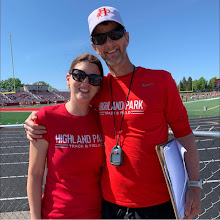If nothing else, my last two posts have given me a lot to think about (and hopefully you too). I spent nearly all of this morning’s run thinking about Yvonne’s comment and questions and I came up with a bunch of other ramblings.
First, I posted Beck’s Why Stop There? article the other day. If you haven’t read it, I highly recommend it.
Yvonne, I agree with Chelle that training is cumulative. That’s why I talked about my training this year being for 3-4 years down the line. However, keep in mind that your time as a runner is going to play a huge role in this. If you’re fairly new to running, I agree that you could probably stick to 45 mpw and still see some improvements. However, if you’ve been running for 25 years, I don’t think sticking to your current mileage is really going to lead to any kind of significant breakthrough.
As for Mike’s results; if we were talking about him dropping from 3:57 to 3:47 to 3:40 then I’d say it’s more likely a cumulative effect. However, when you’re racing at his speeds, I’ve gotta believe it’s due to the mileage. While I’m sure there are people out there that can manage sub-2:40 on 55 mpw, I don’t think there are many. And if they can, they probably “should/could be” running sub-2:20. As Beck points out, just because Joe Schmuckatellie runs a 14-minute 5k on 10 miles a week doesn’t mean that would work for you.
Before I forget, I want to just say that all the numbers I threw around in my last post where just examples. 100 mpw is just a number and I threw in the 800 repeats because “everyone” likes to think in terms of speed work.
I just want to challenge people to push the envelope a little and really examine the limits they’ve placed on their mileage. Of course, I don’t want to come across like I’m telling people how to train. The purpose of this blog lately is to express my thought process and my body’s reactions as I bump my training to a new level. Having a broader picture of my approach makes more sense than just writing that I ran 6 miles in 50 minutes.
Mike, the “I’d rather be slow than injured” statement is tongue-in-cheek, but there’s some truth to it. I view it as, I’d rather listen to my body and run until it tells me to take a day off or cutback for a week – rather than take 1-2 days off every week because some schedule in a book tells me to.
As for the gadget-wearing half marathoners; I don’t think I made it clear that they were letting these gadgets determine their pace – rather than listening to their bodies. We were a minute into the race, they saw 5:40 and 6:20 and said, that’s way to fast we have to slow down. Again, I don’t care if the winner of the race wears one; just don’t let it “take over.”
Subscribe to:
Post Comments (Atom)

4 comments:
So you stuck the "why stop there" question in my head tonight as I was running and did some thinking about it. I posted some of my thoughts on the question although I wonder if I come across as confrontive rather than inquisitive. I agree that we should push our bodies to the limits and appreciate the push now and then.
Good thoughts. I left you a response.
Sorry for the late reply, but I wanted to comment about what you said regarding the gadget-wearing half marathoners. I understand your point about listening to their bodies, but I don't see the difference between someone looking at the GPS a minute into the race and someone checking their watch when they pass the first mile marker, except the obvious fact that the GPS wearers can check their too fast start earlier.
Bart, we were going downhill with a tailwind. How would they know what pace they should be looking for on their GPS?
Also, one read 5:40 and the other 6:20, but the guys were running side-by-side. Which one is accurate?
I'd at least say wait unit you reach the flat section and settle in a bit.
Granted, maybe the 2 gals that ran a 6:15 first mile would have been better off if they had checked their pace 60 seconds into the run.
Heck, even checking your watch at the miles is usually a bad idea because they're rarely accurate. Ever been in a race when someone passes a mile marker and they either speed up or slow down based on a split? I have and it's kind of funny.
Post a Comment